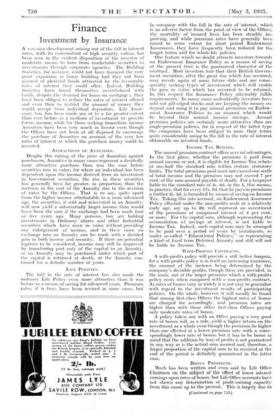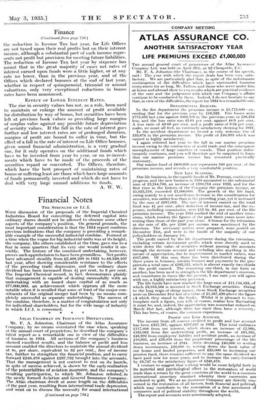Finance
. Investment by Insurance A NOTABLE development arising out of the fall in interest rates, with its concomitant of high- security values, has been seen in the evident disposition of the investor of moderate means to turn from marketable securities to investments through corporate agencies. The Building Societies, for instance, could not have financed the -very great expansion in house building had they not been assured of plentiful funds attracted by the favourable rates of interest they could offer. Indeed, Building Societies have found themselves overwhelmed with funds, despite the demand for loans on mortgage ; they have been obliged to reduce the rates of interest offered and even then to restrict the amount of money they would accept from individual depositors. Life Assur- ance, too, has been made use of to a far greater extent than ever before as a medium of investment to provide future income, while for those seeking immediate income Annuities have been very much in favour even though the Offices have not been at all disposed to encourage the purchase of Annuities on account of the very low rates of interest at which the purchase money could be invested.
ATTRACTIONS OF ANNUITIES.
Despite this raising of the price of Annuities against purchasers, Annuities in many cases represent a decidedly more attractive purchase than was the case before securities rose in value, for where an individual has been dependent upon the income derived from an investment in Government securities, the rise in these securities has generally been far greater, in proportion, than the increase in the cost of the Annuity due to the revision of rates by the Offices. That is to say, quite apart from the higher income attributable to a more advanced age'. the securities, if sold and reinvested in an Annuity, will now yield a substantially larger income than would have been the case if the exchange had been made four or five years ago. Many persons, too, are holding investments in Ordinary shares and other Industrial securities which have risen in value without providing any enlargement of income, and in these cases an exchange into an Annuity can be made with a decided gain in both income and security. If there are potential legatees to be considered, income may still be improved by transferring part only of the capital to, an Annuity, or an Annuity may be purchased under which part of the capital is returned at death, or the Annuity con- tinued for a definite number Of years.
LIFE POLICIES.
The fall in the rate of interest has also made the ordinary Life Policy even more attractive than it was before as a means of saving for advanced years. Premium rates, it is true, have been revised in some cases, but in company with the fall in the rate of interest, which is an adverse factor from the point of view of the Offices, the mortality of insured lives has been steadily im- proving, and while premium rates have generally been raised to some extent for short period Endowment Insurances, they have frequently been reduced for the longer terms and fdr 'whole-life policies.
One feature which no doubt attracts investors towards an Endowment ,Inlyzance Policy as a means of saving at the present time is the guaranteed character of the contract. Most investors fear that their British Govern- ment securities, after- the great rise which has occurred, may recede again at some future date and are conse- quently seeking types of investment which will enable the gain in value which has • occurred to be retained. In this respect the Insurance Policy admirably fulfils requirements. In many cases undoubtedly investors have sold out gilt-edged stocks and are keeping the money on deposit and using it to pay annual premiums on Endow- ment Assurance Policies to .an amount which would be beyond their . normal income savings. AnnUal premium policies are certainly more attractive than are single-premium policies, for in resp ect of the latter type the companies have been obliged to raise their terms quite considerably owing to the fall in the rate of interest obtainable on invested funds.
INCOME TAX REBATE.
The annual premium contract offers seve ral advantages. In the first place, whether the premium is paid from annual income or not, it is eligible for Income Tax rebate at one-half .the standard rate within certain statutory limits. The total premiums paid must not exceed one-sixth of total income and-the premium may not exceed 7 per cent. of the sum assured payable at death. For a taxpayer liable to the standard rate of 4s. 6d. in the £, this means, in practice, that for every 17s. 9d. that he pays in premiums. a further 2s. 3d. is furnished by means of saving on Income Tax. Taking this into account, an Endowment Assurance Policy effected under the non-profits scale at a relatively early age, say up to 30, will represent an investment of the premiums at compound interest of 4 per cent. or more. For t he capital sum, although representing the accumulation o f savings at interest, is not liable to Income. Tax; Indeed, such capital sum may be arranged to be paid over a period o f years by instalments, as under so-called " Educational Policies," so representing a kind of fixed term Deferred Annuity and still will not be liable to Income Tax.
WITH-PROFITS CONTRACTS.
A with-profits policy will provide a still better bargain; for a with-profits policy is in itself an increasing insurance, the amount of the increase being determined by the company's divisible profits, though these are provided, in the main, out of the larger premium which a with-profits policy costs when compared with a non-profits- contract As rates of bonus vary so widely it is not easy to generalize with regard to the investment results of participating policies. On the whole, however, it will usually be found that among first-class Offices the highest rates of bonus • are charged for accordingly, and premium rates are higher than with those other first-class Offices paying only moderate rates of bonus.
A policy taken out with an Office paying a very good rate of bonus will, as a rule, yield a higher return on the investment as a whole even though the premium be higher than one effected at a lower premium rate with a corre- spondingly lower rate of bonus, but it has to be borne in mind that the addition by way of profits is not guaranteed in any way as is the actual sum assured and, therefore, a larger proportion of the capital sum to be received at the end the period is definitely guaranteed in the latter c
BONUS PROSPECTS.
Much has been written and even said by Life Office
Chairmen on the subject of the effect of lower interest
earnings upon rates of bonus, but Life Office accounts have not shown any deterioration of profit-earning capacity from this cause up to the present. This is largely due to (Continued on page 753.)
Finance
(Continued from page 750.) the reduction in Income Tax last year, for Life Offices are not taxed upon their real profits but on their interest inCoine, although a Substantial part of such income repre- sents not profit but provision for meeting future liabilities. The reduction of Income Tax last year by sixpence has meant that in the great majority of cases net rates of iiaterest earned upon funds were a little higher, or at any rate no lower, than in the previous year, and of the Offices which declared bonuses at the end of last year, whether in respect of quinquennial, triennial or annual valuatirns, only very exceptional reductions in bonus rates have been announced.
EFFECT OF LOWER INTEREST RATES.
The rise in security values has not, as a rule, been used to maintain or enlarge the amount of profit available for distribution by way of bonus, but securities have been left• at previous book values so providing large margins of surplus value against any possible future depreciation of security values. If the fall in the rate of interest goes further and low interest rates are of prolonged duration, margins of profit are bound to suffer in time, but the effect of a fall in the rate of interest on Life Office bonuses, given sound financial administration, is a very gradual one, for it only operates on the additional funds which have to be invested from year to year, or on re-invest- ments which have to be made of the proceeds of the securities repaid or converted. The Offices, therefore, which have the best prospect of maintaining rates of bonus or suffering least are those which have large amounts Of funds permanently invested and which do not have to deal with very large annual additions to funds. A. W. W.















































 Previous page
Previous page